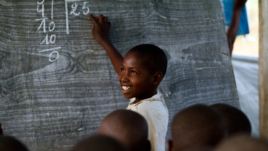This is the VOA Special English Education Report.
Conflicts around the world are keeping tens of millions of young people from going to school. Many have physical or emotional injuries that make it hard or even impossible for them to learn.
Later this year UNESCO will release its 2012 "Education for All Global Monitoring Report." UNESCO is the United Nations Educational, Scientific and Cultural Organization. The yearly publication is part of a global campaign to provide primary education to all children within the next three years.

The report documents the situation in countries that have made the least progress toward the Millennium Development Goals. These goals require universal primary education and equality for boys and girls in schooling by 2015.
Pauline Rose is the director of the report.
PAULINE ROSE: "In those 35 conflict-affected countries, we find 28 million children out of school. In some countries, it's just that schools are not even accessible in conflict zones. The teachers aren't there. The schools are sometimes even attacked."
The Geneva Conventions bar the targeting of public places like schools and hospitals. In some cases, schools are targeted because they represent the government. Pauline Rose says in other cases, schools are targeted for religious or political reasons.
PAULINE ROSE: "So in Afghanistan, given that the idea of girls going to school has been part of the concern of some militant groups, that has been a cause for their direct attack on girls schools. In other parts of the world, it might be more that schools are caught in the crossfire."
Conflicts also put girls and boys at risk of sexual violence. Schoolchildren are also at risk of being forced to become soldiers.
Under international law, refugees are the only displaced people with a guaranteed right to education. But that guarantee often means little. Schools in refugee camps often have limited money for teachers and supplies.
Last year, Pauline Rose visited the Dadaab camps in northern Kenya. Those camps shelter more than 250,000 refugees from Somalia.
PAULINE ROSE: "So you have half of children without any access to school. You have sort of classes of over 300 children, and I mean just the conditions getting worse and worse."
What if conflict states in sub-Saharan Africa moved just ten percent of their military spending to education? UNESCO says they could educate more than one-fourth of their out-of-school population. And in Pakistan, it says 20 percent of the military budget could provide primary education for all children.
But one country has been a real success story. For years, Botswana has used its wealth from diamond exports to finance universal primary education and to create a skills base for its growing economy.
And that's the VOA Special English Education Report. I'm Jim Tedder.
The problem with plagiarism in South Korea
Gang prevention programs target children at risk
The problem with plagiarism in South Korea
(来源:VOA 编辑:旭燕)
关注和订阅


电话:8610-84883645
传真:8610-84883500
Email: languagetips@chinadaily.com.cn